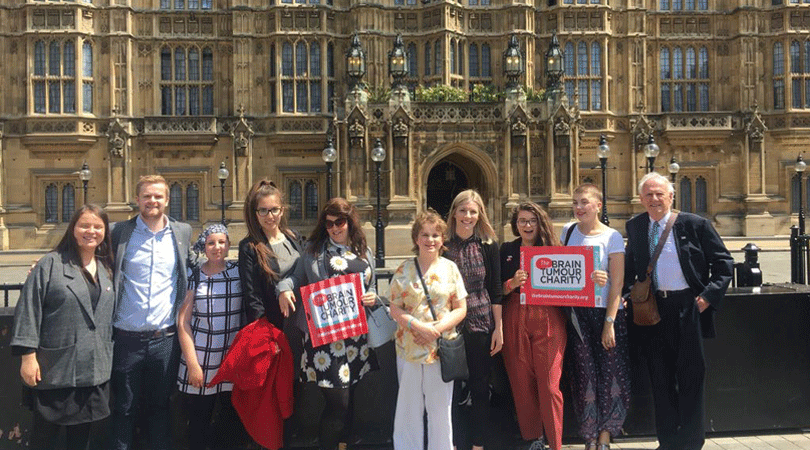Back on World Cancer Day 2022 in February, then Health Secretary Sajid Javid MP launched a call for evidence for a new 10-Year Cancer Plan for England. This plan aims to set out a vision and long term approach for cancer services in England until 2032.
The 10-Year Cancer Plan is a welcome opportunity for the government to prioritise brain tumours, and other less survivable cancers, with a clear, targeted plan that is fully funded and resourced. We submitted our response to the consultation back in April, and would like to thank those of you who submitted your own response to the government survey.
The 10-Year Cancer Plan was due to be published in the summer, but has not yet been released. The previous Prime Minister, Liz Truss, confirmed in early September that the 10-Year Cancer Plan will be published, but there has been no clear timeframe from government about when this might be. We have yet to hear from Prime Minister Rishi Sunak’s government about the 10-year Cancer Plan.
Our submission included a number of key areas for the government to prioritise in order to drive forward the transformational changes we need in diagnosis, treatments and care, so that outcomes for brain tumours do not fall woefully behind in the progress being made on cancer in the next 10 years.
What are we calling for in the 10-Year Cancer Plan?
We used our response to urge the Government to outline specific commitments and targets for brain and the less survivable cancers. Brain tumours are uniquely complex and require a different approach in many areas of cancer care to other cancers. You can read our full submission and all of the areas we highlighted here.
-
The government must support brain tumour research in the UK by setting out an action plan for how the important and welcome £40million already pledged towards brain tumour research is to be invested in world-class research as soon as possible. We then also need to see a commitment to sustained, ongoing investment to brain tumour research once this £40million has been spent.
Every brain tumour patient should be informed about research and given the opportunity to take part in research wherever possible.
-
The government should commit to multi-year funding for continued cancer awareness campaigns – including working with the NHS and The Brain Tumour Charity to promote a brain tumour signs and symptoms awareness campaign.
In order for brain tumours to be included in the Government’s stated ambitions to improve early diagnosis of cancer, we need to see clear targets established that address early detection for cancers that aren’t staged in the same way, including developing proxy measures to monitor progress.
The government should commit to exploring whether emerging triage tools could improve prompt diagnosis of brain tumours as the evidence develops, including within community diagnostic hubs and rapid diagnostic centres.
-
The government’s cancer plan should commit to tackling the variation in direct access for GPs to MRI and CT scans and take action to ensure all GPs have direct access to imaging for suspected brain tumours. They should also commit to tackling variation in access to 5‑aminolevulinic acid (5‑ALA)-guided resection to ensure all eligible patients with high-grade gliomas have access, as per the NICE Quality Statement.
-
Clarity should be provided on how the money announced in the 2021 Spending Review for NHS workforce will be spent, including for the cancer workforce. This would allow us to move towards the target of every brain tumour patient (high and low grade) having access to a Clinical Nurse Specialist (CNS) or key worker.
Action to ensure Holistic Needs Assessments (HNAs) are being routinely offered to brain tumour patients at diagnosis and any key changes in care, with resulting care plans put in place, is essential in ensuring that all patients receive personalised care and sufficient support.
How did the cancer charity sector respond to the cancer plan?
A number of wider charity sector coalitions that we are members of also responded to the call for evidence.
With other members of the Less Survivable Cancers Taskforce, we submitted a response that highlights the need for prioritisation of the six less survivable cancers – pancreatic, stomach, oesophageal, brain, lung and liver – in order to close the deadly cancer gap between these and other cancers.
We worked as part of the One Cancer Voice coalition, with 54 other cancer charities, to issue a statement that details 10 tests that the new 10-year Cancer Plan must meet if it is to be successful.
We also submitted a response as part of the Children and Young People with Cancer Coalition, to ask for the experience of children and young people to be fully represented in the cancer plan.
What happens next?
We know just how important this 10-Year Cancer Plan could be for brain tumour patients in England, so we will continue to push for a detailed, fully funded and resourced plan that makes a transformative impact on the experiences of brain tumour patients.

How can I get involved?
By campaigning with The Brain Tumour Charity, you can help ensure the issues which affect the brain tumour community remain a political priority.
We campaign on behalf of all people affected by a brain tumour, ensuring your voice is heard where it matters most. Whether you can give a little time or a lot, we’d love you to join us and raise your voice for change.
